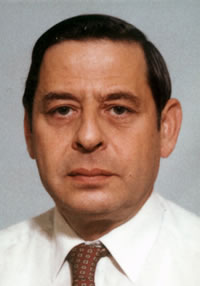Reuven (Tommy) Pfeffermann
b.7 September 1936, Timișoara - d.12 May 2004, IsraelSurgeon, one of the pioneers of kidney grafts in Israel
Jew from Romania, surgeon, professor at the Hebrew University of Jerusalem and director of the surgery department of Kaplan Hospital in Rehovot. Pfeffermann was known for his contributions to traumatic surgical treatment and organ transplant surgery, being one of the pioneers of kidney grafts in Israel.
Reuven (Tommy) Pfeffermann was born in Timișoara in 1936 as the younger of Dr. Jenő (Eugen) Yona Pfeffermann's two sons, an obstetrician and family physician, one of the leaders of the Zionist movement in Transylvania and Banat. His older brother, Eran, was born in Jerusalem at the request of his parents, a year and a half earlier. The family then returned to Timisoara. His father died suddenly of his heart in 1944, when Reuven was 8 years old. After studying for a time at the Jewish elementary school in Timișoara, in 1946 his mother Judith (Yehudit) Pfeffermann and their two children emigrated to Palestine, which was then in the last years of the British mandate, and settled in Jerusalem. The two brothers studied at the boarding school in the youth village of Ben Shemen. During the siege of the town by the Arabs during the Israeli War of Independence, they were evacuated with the other students to Kfar Witkin commune. They later returned to the family home in Jerusalem. From the 10th grade, Peffermann studied at the prestigious Beit Hakerem High School, which later became the high school of the Hebrew University.
In 1954 Pfeffermann began studying medicine at the Hebrew University under a contract with the Israeli army. A heavy blow to him was the death of his brother Eran, who was accidentally killed by a bullet on November 8, 1954, during the course of infantry officers. Following this event, his will to help the wounded in general, and those in the army in particular, was strengthened. Pfeffermann worked as a doctor at Sheba Hospital in Tel Hashomer. In 1962 he began his military service as a doctor in the Air Force. He was particularly concerned with the evacuation of the wounded by air.
He majored in surgery at Hadassa Ein Kerem Hospital in Jerusalem. He has trained in the treatment of traumatic emergencies, including during the Six Day War and operations against Palestinian guerrilla and terrorist organizations in the Jordan Valley. During the Yom Kippur War, he served at the Refidim Central Military Hospital in Sinai, under the command of his mentor, Roni Rozin. Following the experience gained, the two developed a theory of the Triage Hospital. The results of his experience in the treatment of the wounded were published by Pfefferman in a 1976 article in the Journal of Trauma.
In 1974-1976, Pfeffermann studied kidney transplantation and immunology in New York with Professor Samuel Kountz. Back home, he led the kidney transplant unit at Hadassa Ein Kerem Hospital with Prof. Arie Durst. During that time he was appointed extraordinary professor at the Hebrew University.
In March 1979, he was appointed head of the surgery department at Kaplan Hospital in Rehovot, which he restructured and led until his retirement.
Pfefferman was also an acclaimed teacher who had many distinguished students, including surgeons Dani Simon, Hadar Merhav and Oz Shapira. He also promoted sports to organ transplants, being one of the founders and president of the "Israeli Sports Association for Organ Transplants" until the end of his life.
Reuven Pefeffermann passed away in May 2004 at the age of 68 due to primary pulmonary fibrosis. He was buried in the alternative cemetery in Givat Brenner. He was married to Lea Ofir-Pfeffermann, a nurse by profession. His widow continued his work to promote sports among those who had undergone an organ transplant.
In memoriam
The Israeli Sports Transplant Association, which operated until 2010, was named after him.
Selection of articles
- Reuven Pfeffermann, Ron R. Rozin, Arie Durst, and G. Marin, Modern War Surgery: Operationsin an Evacuation Hospital during the October 1973 Arab-Israeli War,Journal of Trauma 16, no. 9 (September 1976), pp.694–703;Reuven Pfefferman, Ron R. Rozin -chapter Management of Abdominal Injuries p.446-456, in Manual of Disaster Medicine:Civilian and Military, Springer Verlag, Berlin 1989 (eds:Daniel Reis, Eran Dolev)
- Reuven Pfeffermann, Dr. Hadar Merhav, Harry Rofhstein and Dan Simon The use of laser in rectal surgery Lasers in Surgery and Medicine, Volume 6, Issue 5, 1986, Pages: 467–469 oct 2005
- Gallstone Pancreatitis Exploration of the Biliary System in Acute and Recurrent PancreatitisHerbert Freund, MD; Reuven Pfeffermann, MD; Arieh L. Durst, MD; Nathan Rabinovici, MD Arch Surg. 1976;111(10):1106-1107.
- R.Pfeffermann, B.Vidne, S.Leapman, K.Butt. S. Kountz Urologic complications in renal primary and re-transplantation. Experience with 200 consecutive transplants Am J Surg 131:242-245, 1976
Article taken from wikipedia.ro https://ro.wikipedia.org/wiki/Reuven_Pfeffermann
Sources
- biography on the site israel surgery
- Eran Pfeffermann, his brother, on the memorial site of the Israeli Ministry of Defense
- obituary on the site of the Israeli Surgery Association
- Israeli Association for the Sport of Organ Transplants
- Transplant Olympiad on the site Besiman tov
- Medicine: King of Hearts interview with prof. Oz Shapira] de Wendy Elliman, Hadassah magazine April-May 2009
